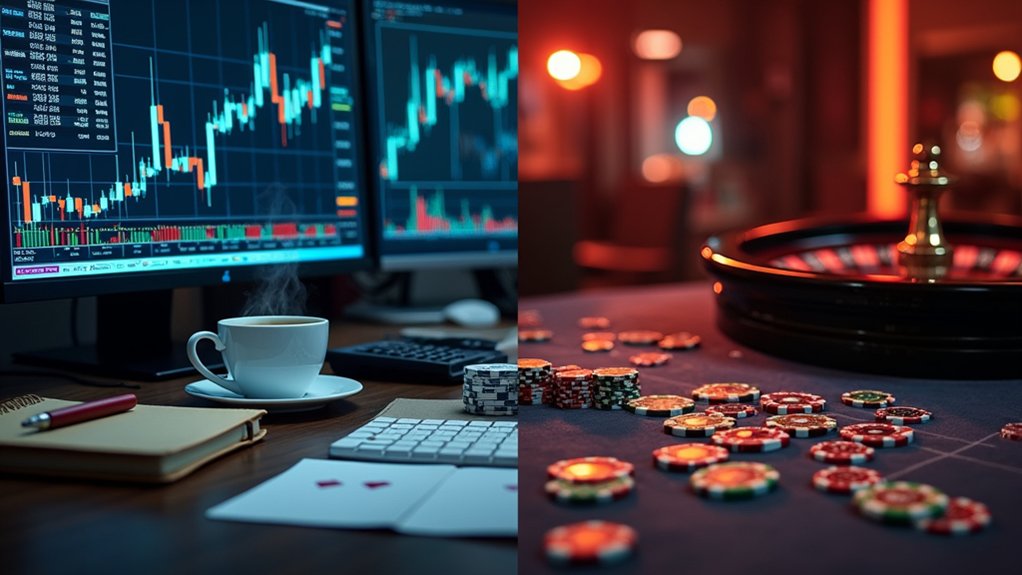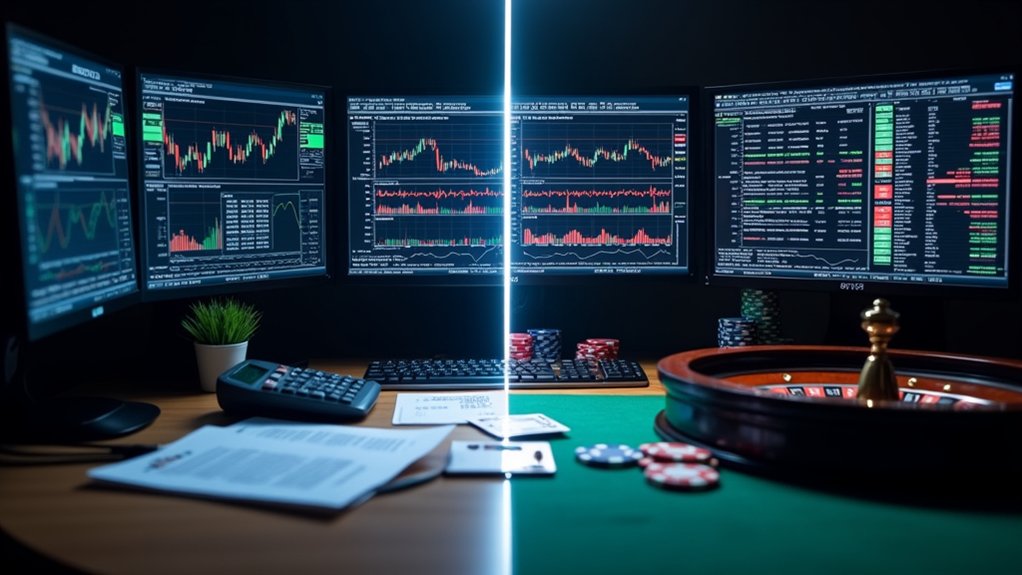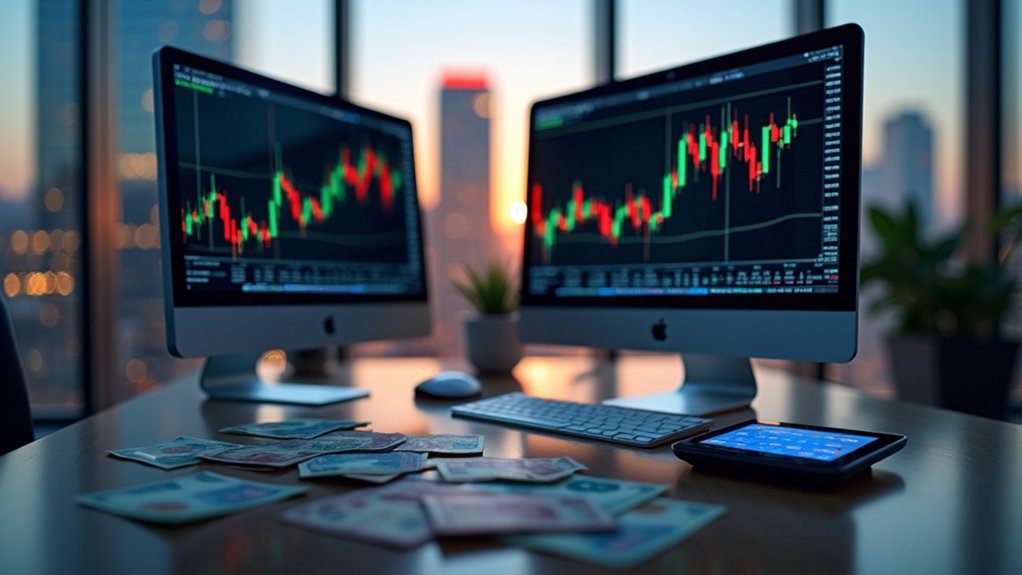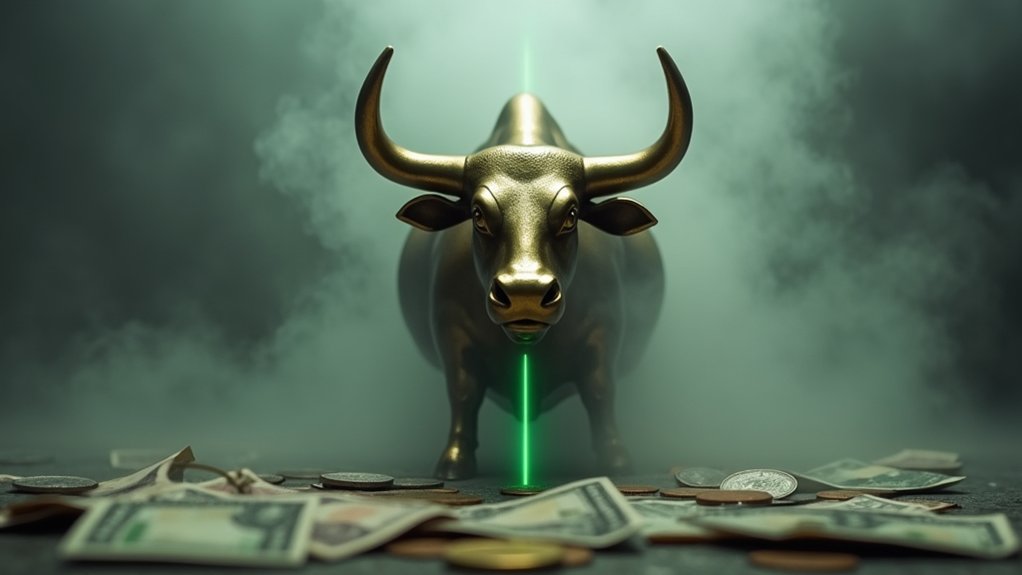Forex trading and gambling split on one pivotal point: control. Traders deploy stop-losses, position sizing, and actual market analysis to manage risk and adapt mid-play. Gamblers? They're stuck with fixed odds and a house edge mathematically rigged to bleed them dry. Casinos don't offer backtesting or hedging tools. Trading platforms do. Sure, impulsive trades without strategy look a lot like roulette, but legitimate Forex operates on data, not dice rolls. The distinctions run deeper than most realize.

Across Africa, from the bustling streets of Lagos to the trading floors of Johannesburg, a debate rages with real money on the line: Is Forex trading just glorified gambling, or something fundamentally different?
Forex versus gambling: where real money meets real debate across African financial centers.
The truth? They're worlds apart. Outcomes tell the story. Forex trading relies on analysis, strategy, and actual market data. Gambling? Pure chance and fixed odds. A Nigerian trader studying Central Bank of Kenya policy decisions before trading USD/KES operates in a completely different universe than someone spinning slots at Sun City. Long-term profitability exists in Forex through systematic discipline. Gambling guarantees mathematical loss over time because of house edge. That's not opinion. That's math.
Skill matters in trading. Experience counts. Continuous education actually changes outcomes. In Nairobi, Accra, or Cairo, traders who master technical analysis genuinely improve their edge. Meanwhile, a roulette wheel in Mauritius doesn't care how educated you are. The odds stay identical whether you studied for years or walked in yesterday. Traders can backtest strategies, practice in demo accounts, analyze what worked and what failed. Gamblers get no such luxury. Casinos offer zero tools to improve your odds beyond learning basic rules.
Risk management separates professionals from pretenders. Forex platforms provide stop-loss orders, position sizing, portfolio diversification across pairs like ZAR/USD, GBP/EGP, or EUR/NGN. These tools exist specifically to control losses. Successful traders implement position sizing rules that calculate exactly how much capital to risk based on account size and market volatility. Gambling? Once you place that bet, your entire stake faces elimination. No emergency exit. No hedging. Professional traders in South Africa or Morocco risk tiny percentages per trade, maybe two percent maximum. Gamblers frequently chase losses, doubling down when already bleeding. That's called tilting, and it's exactly where trading becomes gambling. Many traders fail not from lack of education, but from abandoning their proven strategies during emotional downturns. Broker-provided leverage in Forex allows traders to control larger positions with smaller capital deposits, a credit facility that gambling platforms are strictly prohibited from offering.
Knowledge actually influences Forex outcomes. Traders monitoring SARB announcements, oil price impacts on the Angolan kwanza, or political stability affecting the Sudanese pound make informed decisions based on real data. Casino outcomes ignore external factors entirely. The cards, dice, or wheels operate in sealed probability bubbles. Understanding how central bank policies and geopolitical events shift currency values provides actionable intelligence that directly affects trading decisions. Legitimate Forex trading operates within regulatory standards that require transparency, capital adequacy, and client fund protection—safeguards completely absent from gambling establishments.
Emotional discipline determines survival. Trading rewards patience and plan adherence. Impulsive decisions—randomly entering GBP/ZMW because you're bored, chasing losses on USD/TZS after a bad morning—that's gambling behavior wearing trading clothes. The platform doesn't matter. The mindset does. Automated trading systems, predefined exit strategies, and trade journals exist precisely to combat emotional sabotage. Gambling thrives on emotional highs, the rush, the thrill. Trading kills accounts that chase thrills. Effective capital preservation requires traders to implement defensive strategies that protect their trading accounts during volatile market conditions. Different games. Different rules. Different outcomes.
Common Questions
Can Nigerian Traders Use Technical Analysis to Avoid Gambling-Like Forex Behavior?
Yes, Nigerian traders can use technical analysis to separate skill from gamble.
Price charts, indicators like Moving Averages and RSI, plus support and resistance levels give structure to decisions. Stop-loss and take-profit orders replace emotion with discipline. Position sizing and risk-to-reward ratios prevent reckless bets. Backtesting strategies and tracking performance metrics turn hope into evidence.
Local knowledge—NGN volatility, inflation data, policy shifts—adds context that pure guessing lacks. Mobile access helps, but only if paired with actual analysis, not impulse.
Do South African Regulators Classify Forex Losses as Gambling or Investment?
South African regulators don't classify forex losses as gambling—they classify unauthorized forex trading as illegal financial services. Period. The Financial Sector Regulation Act treats forex as investment activity requiring FSCA licensing, not gambling regulation.
Meanwhile, the National Gambling Act explicitly separates gambling from financial services. So when South Africans lose money on unlicensed offshore platforms, regulators see it as participating in illegal finance, not placing bets. The distinction matters legally, even if losses feel identical.
Are Kenyan Forex Scams More Common Than Licensed Broker Operations?
Yes, by a landslide.
Kenyan media and regulators report a flood of forex scams—Kenyans lost over $120 million in crypto scams alone in 2022, and forex follows the same pattern.
Licensed brokers regulated by the CMA exist, but they're vastly outnumbered by fake platforms promising 100% returns in 30 days.
Social media amplifies the mess.
Watchdog lists name dozens of scam operations.
The handful of legitimate brokers can't compete with the noise.
Does Trading With Brokers in Mauritius Reduce Gambling-Style Risks for Africans?
Trading with Mauritian brokers does reduce gambling-style risks—somewhat. The FSC enforces segregated client funds, AML checks, and licensed tiers that separate legitimate forex from casino chaos. African traders get verifiable regulation, audited operations, and legal recourse instead of shadowy offshore platforms.
But let's be real: regulation doesn't cure poor discipline or overleveraging. A Nigerian or Kenyan can still blow their account on a licensed Mauritian platform. The broker's cleaner, sure—but the trader's impulse control? That's still on them.
Can Egyptian Traders Develop Consistent Strategies Despite Currency Control Restrictions?
Egyptian traders can build consistent strategies, but currency controls make it harder.
The country's shifting policies—sudden devaluations, parallel market gaps, liquidity squeezes—turn predictable setups into chaos.
Ministerial decrees and repatriation rules add compliance headaches.
Still, disciplined risk management, hedging against policy shocks, and focusing on locally denominated pairs help.
Staying glued to Central Bank updates is non-negotiable.
Consistency is possible, just not easy.
Currency control environments demand more adaptation than typical retail forex markets elsewhere.










